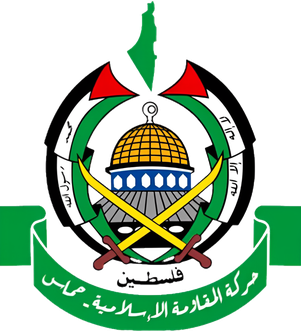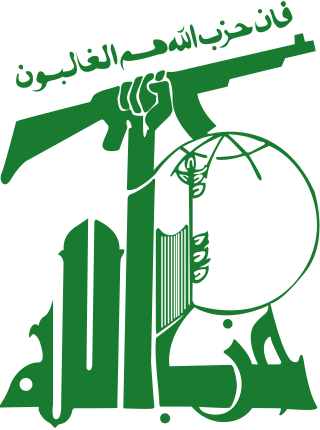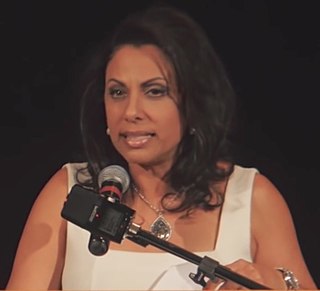
Hamas, an acronym of its official name, the Islamic Resistance Movement, is a Palestinian Sunni Islamist political and military organization governing the Gaza Strip of the Palestinian territories, which are occupied by Israel under international law. Headquartered in Gaza City, it has a presence in the West Bank, the larger of the two Palestinian territories, in which its secular rival Fatah exercises control.

Hezbollah is a Lebanese Shia Islamist political party and militant group, led since 1992 by its Secretary-General Hassan Nasrallah. Hezbollah's paramilitary wing is the Jihad Council, and its political wing is the Loyalty to the Resistance Bloc party in the Lebanese Parliament.

Zionist political violence refers to politically motivated violence or terrorism perpetrated by Zionists. The term is used to describe violence committed by those who support the political movement of Zionism, and violence committed against opponents of Zionism. The violence often takes the form of terrorist attacks and has been directed against both Jewish and Arab targets. The most active period of most notable Zionist political violence began on June 30, 1924, through the 1940s, and continues to the present day, usually for the purpose of expanding Zionist settlements in Palestine.
This timeline of the Israeli–Palestinian conflict lists events from 1948 to the present. The Israeli–Palestinian conflict emerged from intercommunal conflict in Mandatory Palestine between Palestinian Jews and Arabs, often described as the background to the Israeli–Palestinian conflict. The conflict in its modern phase evolved since the declaration of the State of Israel on May 14, 1948 and consequent intervention of Arab armies on behalf of the Palestinian Arabs.

Information warfare (IW) is the battlespace use and management of information and communication technology (ICT) in pursuit of a competitive advantage over an opponent. It is different from cyberwarfare that attacks computers, software, and command control systems. Information warfare is the manipulation of information trusted by a target without the target's awareness so that the target will make decisions against their interest but in the interest of the one conducting information warfare. As a result, it is not clear when information warfare begins, ends, and how strong or destructive it is.
Cyberterrorism is the use of the Internet to conduct violent acts that result in, or threaten, the loss of life or significant bodily harm, in order to achieve political or ideological gains through threat or intimidation. Acts of deliberate, large-scale disruption of computer networks, especially of personal computers attached to the Internet by means of tools such as computer viruses, computer worms, phishing, malicious software, hardware methods, programming scripts can all be forms of internet terrorism. Cyberterrorism is a controversial term. Some authors opt for a very narrow definition, relating to deployment by known terrorist organizations of disruption attacks against information systems for the primary purpose of creating alarm, panic, or physical disruption. Other authors prefer a broader definition, which includes cybercrime. Participating in a cyberattack affects the terror threat perception, even if it isn't done with a violent approach. By some definitions, it might be difficult to distinguish which instances of online activities are cyberterrorism or cybercrime.
Walter Ze'ev Laqueur was a German-born American historian, journalist and political commentator. He was an influential scholar on the subjects of terrorism and political violence.
Mark A. Gabriel is an Egyptian-American lecturer and writer on Islam who lives in the United States. He is the author of five books critical of salafi Islam, including Islam and Terrorism, Islam and the Jews, and Journey into the Mind of an Islamic Terrorist.
Jewish extremist terrorism is terrorism, including religious terrorism, committed by extremists within Judaism.
Al-Fateh was an online children's magazine in Arabic. It began publication in September 2002, and its 108th issue was released in mid-September 2007. The magazine featured stories, poems, riddles, and puzzles.

Brigitte Gabriel is a Lebanese-American conservative activist, author and lecturer, and critic of Islam. She is the founder of ACT for America, which has been described as "the largest grassroots anti-Muslim group" in the United States.
The tactics of terrorism are diverse. As important as the actual attacks is the cultivation in the target population of the fear of such attacks, so that the threat of violence becomes as effective as actual violence. The different tactics that terrorist groups utilize can be very simple to extremely complex.
Raphael Israeli is an Israeli historian and writer. He is a professor emeritus of Middle Eastern, Islamic and Chinese history at the Hebrew University of Jerusalem, as well as a research fellow at Truman Institute for the Advancement of Peace and the Jerusalem Center for Public Affairs.
Since the Iranian Revolution in 1979, the government of the Islamic Republic of Iran has been accused by several countries of training, financing, and providing weapons and safe havens for non-state militant actors, such as Hezbollah in Lebanon, Hamas in Gaza, and other Palestinian groups such as the Islamic Jihad (IJ) and the Popular Front for the Liberation of Palestine (PFLP). These groups are designated terrorist groups by a number of countries and international bodies such as the EU, UN, and NATO; however, Iran considers such groups to be "national liberation movements" with a right to self-defense against Israeli military occupation. These proxies are used by Iran across the Middle East and Europe to foment instability, expand the scope of the Islamic Revolution, and carry out terrorist attacks against Western targets in the regions. Its special operations unit, the Quds Force, is known to provide arms, training, and financial support to militias and political movements across the Middle East, including Bahrain, Iraq, Lebanon, Palestine, Syria, and Yemen.
Evan F. Kohlmann is an American terrorism consultant who has worked for the FBI and other governmental organizations.

Nitsana Darshan-Leitner is an Israeli attorney, human rights activist, and the founder of Shurat HaDin – Israeli Law Center. As the president of the Shurat HaDin, she has represented hundreds of terror victims in legal actions against terror organizations and their supporters. Darshan-Leitner initiated a legal campaign to deprive terrorists of social media resources such as Facebook and Twitter. Darshan-Leitner assisted in blocking the Gaza Freedom Flotilla.

Bruce R. Hoffman is an American political analyst. He specializes in the study of terrorism, counter-terrorism, insurgency, and counter-insurgency. Hoffman serves as the Shelby Cullom and Kathryn W. Davis Senior Fellow for Counterterrorism and Homeland Security on the Council on Foreign Relations, and is a professor at the School of Foreign Service of Georgetown University, where he directs its Center for Jewish Civilization. In addition, he is the Professor Emeritus and Honorary Professor of Terrorism Studies at the University of St Andrews, and is the George H. Gilmore Senior Fellow at the U.S. Military Academy's Combating Terrorism Center.







